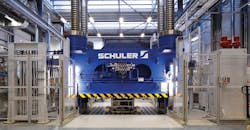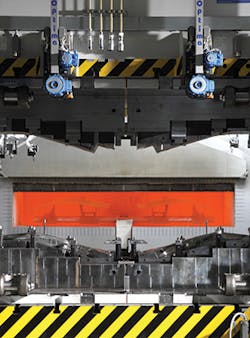Harder and Faster Forming for Lighter Materials
Designing forming process equipment that meets manufacturers’ evolving standards for performance, efficiency, throughput, and reliability calls for attention to details, to the system components, as well as a holistic understanding of the entire process to be realized. Let’s start with the detail design, meaning with some basic material science.
Producers of forged and formed components want their manufacturing systems to achieve longer tool life and to operate with shorter cycle times. They want everything to be harder and faster. For forming automotive body parts, press hardening has numerous advantages. But to gain those advantages in the finished products the press hardening machinery must offer the manufacturers long-term availability for the tooling as well as shorter cycle times, and so the mold insert must be made of a high-strength tool steel that also allows for increased quenching speed.
A press hardening tool formed in Thermodur 2383 Supercool, a new specialty steel grade developed by Deutsche Edelstahlwerke.
Deutsche Edelstahlwerke (DEW), a Schmolz + Bickenbach Group company, developed Thermodur 2383 Supercool for this application. DEW produces tool steels, stainless, acid- and heat-resistant steels, engineering and bearing steels, and special materials, which are available as long products ranging from 0.7-mm diam. drawn wire up to 1,100-mm diam. forgings
This new hot-work tool steel combines exceptional mechanical properties and wear resistance with considerable thermal conductivity. Together, these properties bring a new standard of performance in press hardening tools.
Press hardening (or hot stamping) is a hot forming process for producing high-strength body parts. A preferred ratio of strength to weight can be adjusted, equivalent to lightweight construction of car bodies using steel instead of more expensive light metal alloys. The sheet metal part is hot-formed and heat treated in a single, combined process step. Steel sheets are heated to austenitizing temperature and subsequently transferred into a press tool featuring active cooling. As such, quenching and forming are performed simultaneously.
In addition to good mechanical properties like strength, through hardenability, and wear resistance, thermal conductivity of the tool steel used for this process is critical for the uniformity of quenching as well as the cycle time, and thus the cost-effectiveness of press hardening.
Compared to conventional hot-work steels (1.2343, 1.2344, and 1.2367) in quenched and tempered condition, Thermodur 2383 Supercool (45 HRC) exhibits a significantly higher thermal conductivity of 44 W/(mK) at 100 °C. A die insert made of this material is able to conduct heat from the heated sheet in a controlled manner very quickly. In addition, the steel is more resilient at consistently high temperatures, which is demonstrated “by the lack of significant loss of hardness,” according to the developer. Together with resistance to thermal shock, this may contribute to tool endurance in highly demanding applications like high-strength, high-hardness forming.
The technological applications of forming also are developing in unexpected ways as a consequence of the prevailing design demand for lightweight products. PGTEX, a producer of lightweight composite parts in Jiangsu, China, has ordered a 3,600-mt (35 KN) hydraulic press from Schuler AG. PGTEX seeks to lower production costs and process efficiency for producing composite parts that can be used in automotive assembly, wind-power structures, and other transportation or recreational manufacturing uses.
The new Schuler press will allow PGTEX to start high-volume production of carbon-fiber reinforced plastic auto body parts for electric-powered SUVs, built in China. The installation also will include a Hennecke dosing machine for injecting resin. The new machine will be delivered early in 2019.

